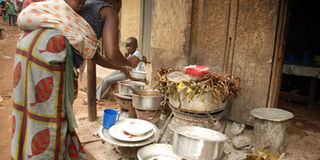Character traits of slum urbanism

Beyoncé (her mother is called mama Beyoncé) clasps on her mother’s bark who is busy serving customers at her local restaurant. You can get a meal for as low as Shs500 in Katanga slum. Photo BY Edgar R. Batte
What you need to know:
Job gap. It has been reported that Ugandan universities and other tertiary instituions are producing more graduates than the rate at which formal jobs are being created
The last two weeks of November 2014 were not good for Kampala. First an infant, whose mother was facing charges related to illegal vending in the city, was tragically killed when a Kampala City Council Authority (KCCA) vehicle ran over him as he wandered the KCCA compound.
A week after that tragedy, the city experienced a downpour which caused flooding along many streets in Kampala, including some of the roads that have only been recently resurfaced by KCCA.
The KCCA has been in existence for about three years now and has done a commendable job of making the city cleaner and more organised. The two incidents cited before however cause one to pause and ask, “What is the real problem of Kampala and are the solutions being employed likely to be effective?
I spent most of the last week of November 2014 at the MS Training Centre for Development Cooperation in Arusha, Tanzania as part of a team developing a course in media and land governance. During my Arusha visit, I came across the work of Professor Edgar Pieterse, a South African urban planning expert, who says countries in the global south are experiencing a phenomenon he calls slum urbanism.
According to Professor Pieterse, slum urbanism is a vicious cycle characterised by six factors; an inverted economy, low and erratic household income, small tax base, insufficient private and public investment in critical infrastructure, skewed allocation systems and demand for services outstripping supply.
Inverted economy
An inverted economy is one where the majority of the working population are in informal employment. For many years now, it has been reported that Ugandan universities and other tertiary instituions are producing more graduates than the rate at which formal jobs are being created.
One often quoted figure is that there is only one formal employment opportunity for every four graduates. Many urban dwellers are therefore pushed to find means of livelihood in informal activities.
Kampala has its multitudes of informally employed people that include the throngs of market traders; bodaboda motorcyclists, people in business centres such as Kikuubo and Kisenyi, patrons of sports betting and street vendors.
To get an idea of how many residents of Kampala depend on informal employment just look at who was the winner the city mayoral election in the past 20 years; certainly it is not the candidate favoured by the formally employed.
Low and erratic income
Many of the people in informal employment have low and erratic income. While formally employed people are assured of regular income, perhaps a salary; those in informal employment can only hope for a lucky day when they are able to make a sale or find a wage earning job. Most of the informal earners are simply urban peasants who live from hand to mouth and if they cannot earn they have to either starve or borrow or steal to make ends meet.
Small tax base
Although the urban population is burgeoning, the tax base remains small, why? Folks in the informal sector do not pay taxes because often they are below the radar of the tax woman and even when they are caught their income is too little to be divided between food at home and government coffers.
Somewhat confusing for Uganda is that there are also people who have informal money such as a person with a gross salary of Shs2 million who is ‘miraculously’ able to build a Shs400 million house and acquire a Shs60 million debt free!
In response to the small tax base, the government may come up with proposals such as taxing parafin and salt too.
James Abola is the team leader of Akamai Global, a consultancy firm based in Ntinda, Kampala. Email: [email protected]



